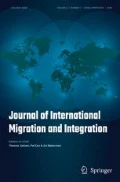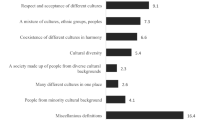Abstract
This study examines intercultural relations among Cape Verdean immigrants living in Portugal. Seven specific predictions based on three general hypotheses (multiculturalism hypothesis, contact hypothesis and integration hypothesis) were tested. The sample of this research consisted of 283 Cape Verdean migrants (51% females) with an average of 35 years. The average duration of residence in Portugal was 18 years. In line with the multiculturalism hypothesis, cultural security was positively related to integration, tolerance and cultural identity. The contact hypothesis was also supported, as intercultural contact was related to positive intergroup attitudes. Regarding the integration hypothesis, psychological adaptation and intercultural adaptation were predicted by integration, whilst sociocultural adaptation was only predicted by marginalisation. Thus, the integration hypothesis was partially supported for Cape Verdean immigrants living in Portugal. Findings are discussed considering the existing literature.
Similar content being viewed by others
References
Abu-Rayya, H. M., & Sam, D. L. (2016). Is integration the best way to acculturate? A reexamination of the bicultural-adaptation relationship in the “ICSEY data set” using the bilinear method. Journal of Cross-Cultural Psychology, 48, 287–293.
Allport, G. W. (1954). The nature of prejudice. Reading: Addison-Wesley.
Arenas, F. (2015). Migrations and the size of African Lisbon: time space of Portuguese (post)coloniality. Postcolonial Studies, 18, 353–366.
Banting, K., & Kymlicka, W. (2013). Is there really a retreat from multiculturalism policies? New evidence from the multiculturalism policy índex. Comparative European Politics, 11, 577–598.
Batalha, L. (2004a). The Cape Verdean diaspora in Portugal: colonial subjects in a postcolonial world. Lanham: Lexington Books.
Batalha, L. (2004b). Contra a corrente dominante: Histórias de sucesso entre cabo-verdianos da segunda geração. Etnográfica, 8, 297–333.
Batalha, L. (2008). Cape Verdeans in Portugal. In L. Batalha & J. Carling (Eds.), Transnational archipelago: perspectives on Cape Verdean migration and diaspora (pp. 61–72). Amsterdam: Amsterdam University Press.
Berry, J. W., & Sabatier, C. (2010). Acculturation, discrimination, and adaptation among second generation immigrant youth in Montreal and Paris. International Journal of Intercultural Relations, 34, 191–207.
Berry, J. E., & Ward, C. (2016). Multiculturalism. In D. Sam & J. W. Berry (Eds.), The Cambridge handbook of acculturation psychology (second ed., pp. 441–463). Cambridge: Cambridge University Press.
Berry, J. W. (1997). Immigration, acculturation and adaptation. Applied Psychology. An International Review, 46, 5–68.
Berry, J. W. (2006). Mutual attitudes among immigrants and ethnocultuaal groups in Canada. International Journal of Intercultural Relations, 30, 719–734.
Berry, J. W. (2013). Research on multiculturalism in Canada. International Journal of Intercultural Relations, 37, 663–675.
Berry, J. W. (2015). Intercultural adaptation to acculturation. Paper presented at Annual Conference, Canadian Psychological Association, Ottawa, June.
Berry, J. W. (2017). Mutual intercultural relations in plural societies. Cambridge: Cambridge University Press.
Berry, J. W., & Kalin, R. (1995). Multicultural and ethnic attitudes in Canada: an overview of the 1991 national survey. Canadian Journal of Behavioural Science, 27, 301–320.
Berry, J. W., Phinney, J. S., Sam, D. L., & Vedder, P. (Eds.). (2006). Immigrant youth in cultural transition: acculturation, identity and adaptation across national contexts. Mahwah: Lawrence Erlbaum Associates.
Berry, J. W., Kalin, & Taylor, D. (1977). Multiculturalism and ethnic attitudes in Canada. Ottawa: Supply & Services.
Berry, J. W., Power, S., Young, M., & Bujaki, M. (1989). Acculturation attitudes in plural societies. Applied Psychology. An International Review, 38, 185–206.
Brown, C. M., Gibbons, J. L., & Hughes, H. M. (2013). Acculturation clusters and life satisfaction. Acta de Investigación Psicológica, 3, 1108–1121.
Challinor, E. (2008). Home and overseas: the Janus face of Cape Verdean identity. Diaspora, 17, 84–104.
Diener, E. R., Emmons, R., Larsen, R., & Griffin, S. (1985). The satisfaction with life scale. Journal of Personality Assessment, 49(1), 71–75.
Ferreira, L. E. (1997). Cabo Verde: Educar para a diversidade. Lisboa: Universidade Aberta.
Fikes, K. (2009). Managing African Portugal: the citizen-migrant distinction. London: Duke University Press.
França, L. (Ed.). (1992). A comunidade cabo-verdiana em Portugal. Lisbon: Instituto de Estudos para o Desenvolvimento.
Gieling, M., Thijs, J., & Verkuyten, M. (2014). Dutch adolescents’ tolerance of Muslim immigrants: the role of assimilation ideology, intergroup contact, and national identification. Journal of Applied Social Psychology, 44, 155–165.
Haeni Hoti, A., Heinzmann, S., Müller, M., & Buholzer, A. (2017). Psychosocial adaptation and school success of Italian, Portuguese and Albanian students in Switzerland: disentangling migration background, acculturation and school context. Journal of International Migration and Integration, 18, 85–106.
Hui, B., Chen, S., Leung, C., & Berry, J. W. (2015). Facilitating adaptation and intercultural contact: the role of integration and multicultural ideology in dominant and non-dominant groups. International Journal of Intercultural Relations, 45, 70–84.
INE. (2012). A população estrangeira em Porugal- 2011. Lisboa: Instituto Nacional de Estatística.
Jasinskaja-Lahati, I., Horencjyk, G., & Kimunen, T. (2011). Time and context in the relationship between acculturation attitudes and adaptation among Russia-speaking immigrants in Finland and Israel. Journal of Ethnic and Migration Studies, 37, 1423–1440.
Lebedeva, N., Tatarko, A., & Berry, J. W. (2016). Intercultural relations among migrants from Caucasus and Russians in Moscow. International Journal of Intercultural Relations, 52, 27–38.
Lonner, W. J., & Berry, J. W. (1986). Sampling and surveying. In W. J. Lonner & J. W. Berry (Eds.), Field methods in cross-cultural research (pp. 85–110). London: Sage.
Malheiros, J., & Horta, A. P. (2008). Citizenship and integration policies in Portugal: an overview of recent immigration to Portugal. Canadian Diversity, 6, 107–110.
MIPEX (2015). Immigrant integration policy. Key findings. Retrieved from http://www.mipex.eu/key-findings
Neto, F. (1993). Satisfaction with Life Scale: psychometric properties in an adolescent sample. Journal of Youth and Adolescence, 22, 125–134.
Neto, F. (1995). Predictors of satisfaction with life among second generation immigrants. Social Indictors Research, 35, 93–116.
Neto, F. (1996). Correlates of social blushing. Personality and Individual Differences, 20, 365–373.
Neto, F. (2002). Acculturation strategies among adolescents from immigrant families in Portugal. International Journal of Intercultural Relations, 26, 17–38.
Neto, F. (2006). Psycho-social predictors of perceived discrimination among adolescents of immigrant background: a Portuguese study. Journal of Ethnic and Migration Studies, 32, 89–109.
Neto, F. (2009a). Predictors of mental health among adolescents from immigrant families in Portugal. Journal of Family Psychology, 23, 375–385.
Neto, F. (2009b). Are attitudes of young Portuguese towards immigration also hardening? A comparison between 1999 and 2006. In A. G. e. K. Mylonas (Ed.), Quod erat demonstrandum: From Herodotus’ ethnographioc journeys to cross-cultural research (pp. 255–264). Athens: Pedio Books Publishing.
Neto, F. (2010). Portugal intercultural: Aculturação e adaptação de jovens de origem imigrante. Porto: Livpsic.
Neto, F. (2012). Re-acculturation and adaptation among adolescents from returned Portuguese immigrant families. Journal of Applied Social Psychology, 42, 133–150.
Neto, F., & Fonseca, A. C. (2016). The satisfaction with migration life scale. International Journal of Intercultural Relations, 54, 47–54.
Neto, F., Pinto, M. C., & Mullet, E. (2019). Can music reduce national prejudice? A test of a cross-cultural musical education programme. Psychology of Music, on-line advance of print publication https://doi.org/10.1177/0305735618774867
Neto, F., Pinto, M., & Mullet, E. (2016). Can music reduce anti-dark-skin prejudice? A test of a cross-cultural musical education programme. Psychology of Music, 44(3), 388–398.
Neto, F., & Wilks, D. (2017). Predictors of psychological adaptation of Cape Verdean students in Portugal. Journal of College Student Development, 58, 1087–1100.
Nguyen, A. M., & Benet-Martinez, V. (2013). Biculturalilsm and adjustment: a meta-analysis. Journal of Cross-Cultural Psychology, 44, 122–159.
Pettigrew, T. F. (2008). Future directions for intergroup contact theory and research. International Journal of Intercultural Relations, 32, 187–199.
Pettigrew, T. F., & Tropp, L. R. (2006). A meta-analytic test of intergroup contact theory. Journal of Personality and Social Psychology, 90, 751–783.
Phinney, J. (1992). The multigroup ethnic identity measure: a new scale for use with diverse groups. Journal of Adolescent Research, 7(2), 156–176.
Phinney, J. (2003). Ethnic identity and acculturation. In K. M. Chun, P. B. Organista, & G. Marín (Eds.), Acculturation: advances in theory, measurement, and applied research (pp. 63–81). Washington, DC: American Psychological Association.
Phinney, J. S., Horencjyk, G., Liebkind, K., & Vedder, P. (2001). Ethnic identity, immigration, and well-being: an interactional perspective. Journal of Social Issues, 57, 493–510.
Rapp, C., & Freitag, M. (2015). Teaching tolerance? Associational diversity and tolerance formation. Political Studies, 63, 1031–1051.
Resende-Santos, J. (2015). Cape Verde: rethinking diaspora in development policy. International Migration, 54, 82–97.
Rosenberg, M. (1965). Society and the adolescent self-image. Princeton: Princeton University Press.
Sequeira Neto, J. (2014). Cultural competence among Ukrainian economic immigrants living in Portugal. Unpublished master dissertation. Faculdade de Economia: Universidade do Porto.
Vigdor, J. L. (2011). Comparing immigrant assimilation inn North America and Europe. Civic report. https://www.manhattan-institute.org/ Accessed 16.05.2016.
Voci, A., & Hewstone, M. (2003). Intergroup contact and prejudice toward immigrants in Italy: the mediational role of anxiety and the moderation role of group salience. Group Processes & Intergroup Relations, 6, 37–52.
Ward, C., & Geeraert, N. (2016). Advancing acculturation theory and research: the acculturation process in its ecological context. Current Opinion in Psychology, 8, 98–104.
Ward, C., & Kennedy, A. (1999). The measurement of sociocultural adaptation. International Journal of Intercultural Relations, 23, 659–677.
Ward, C., & Masgoret, A. M. (2008). Attitudes toward immigrants, immigration, and multiculturalism in New Zealand: a social psychological analysis. International Migration Review, 42, 222–243.
Ward, C., Bochner, S., & Furnham, A. (2001). The psychology of culture shock (2nd ed.). Hove: Routledge.
Wilks, D., & Neto, F. (2016). Exploring the adaptation experiences of Cape Verdean students in Portugal. International Journal of Educational Research, 76, 66–75.
Zhou, S., Page-Gould, E., Aron, A., Moyer, A., & Hewstone, M. (2019). The extended contact hypothesis: a meta-analysis on 20 years of research. Personality and Social Psychology Review, 23, 132-160.
Author information
Authors and Affiliations
Corresponding author
Additional information
Publisher’s Note
Springer Nature remains neutral with regard to jurisdictional claims in published maps and institutional affiliations.
Rights and permissions
About this article
Cite this article
Neto, F. Intercultural Relations Among Cape Verdean Immigrants Living in Portugal. Int. Migration & Integration 21, 765–780 (2020). https://doi.org/10.1007/s12134-019-00679-8
Published:
Issue Date:
DOI: https://doi.org/10.1007/s12134-019-00679-8




